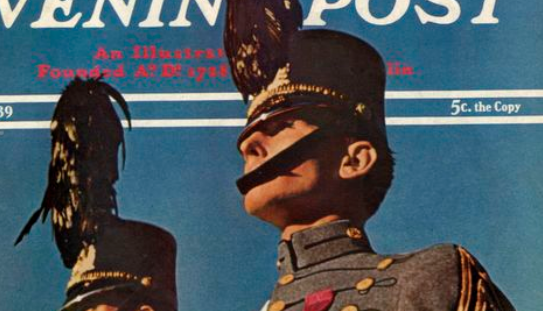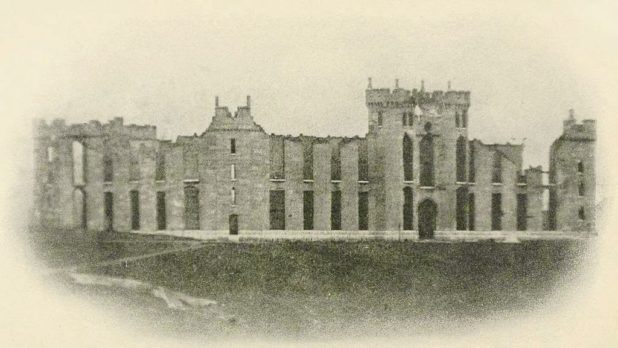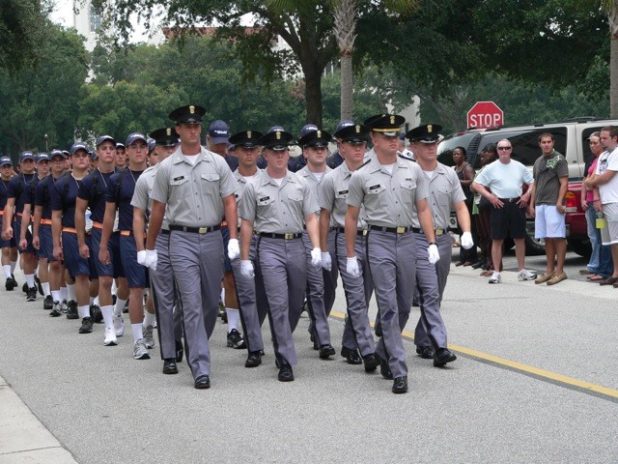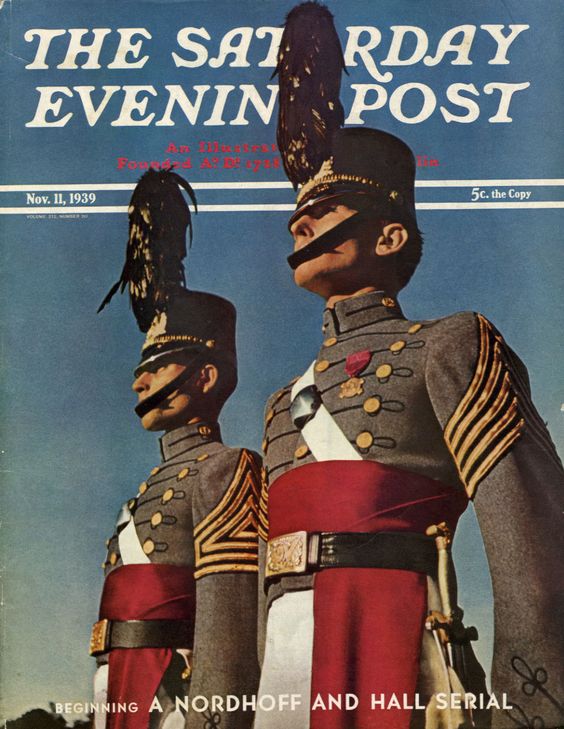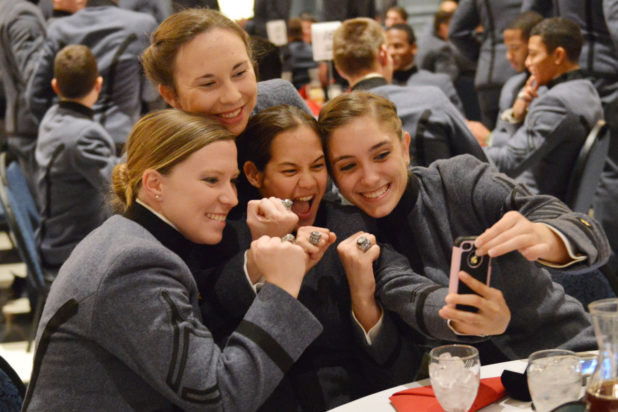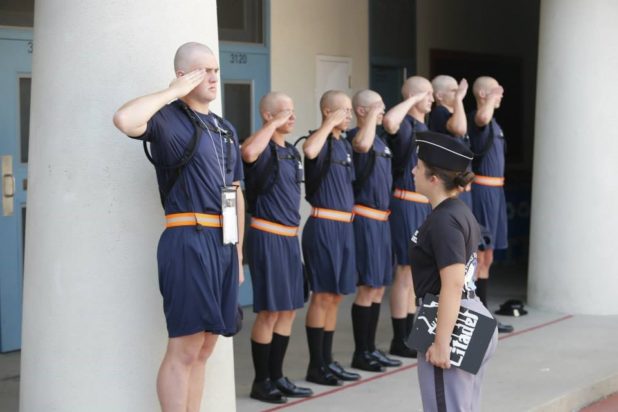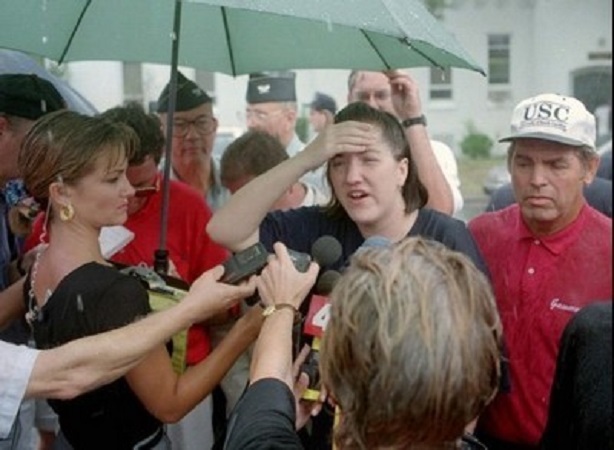Silas Reynolds
The Right Stuff
November 6, 2016
“For almost all of VMI’s more than a century and a half of existence, its single sex status reflected the uniform practice for government supported military colleges. Another famous Southern institution, The Citadel, has existed as a state funded school of South Carolina since 1842…the tradition of having government funded military schools for men is as well rooted in the traditions of this country as the tradition of sending only men into military combat. The people may decide to change the one tradition, like the other, through democratic processes; but the assertion that either tradition has been unconstitutional through the centuries is not law, but politics smuggled into law.” – United States vs. Virginia, Justice Antonin Scalia, Dissenting Opinion
The South has had a long and proud tradition of sending her young White men to military institutions for the purpose of instilling in them the citizen-soldier ideal and embodying academic and leadership education in a system of rigid and Spartan military discipline. The concept of the citizen-soldier is based on Lucius Quinctius Cincinnatus, a Roman citizen born in 519 B.C. After retiring to a farm beyond the Tiber, he heeded the call in 458 B.C. to lead an army against Rome’s enemies. Victorious, he refused all rewards and returned to his farm and plow. He is acknowledged as the role model of the honorable citizen-soldier. This ideal was a core concept for the South’s military academies – a man prepared to take his place in civilian life, but trained and ready for military leadership in time of his country’s need.
The 19th century was the pinnacle of military schools in the United States. By 1860, eleven of the United States’ twelve private or state-supported military colleges were in the South. When the War of Northern Aggression came, most of them closed their doors. Of these, only the two premier schools endured. The Virginia Military Institute (VMI) and The Citadel (The Military College of South Carolina) against heavy odds, persevered during and after the war, sending most of their alumnus into the officer ranks of the Confederacy and, at times, contributed their cadets to the battlefield. In addition, these graduates also composed the elite of the Confederacy’s junior officer ranks, as they had been trained in the art of war, drilling and strict discipline. General George Patton, always proud of his Virginia roots, lost his grandfather, George Smith Patton, VMI Class of 1852, at the Third Battle of Winchester – originally commissioned as a captain, he had been wounded twice in battle and received a posthumous (and unofficial) promotion to brigadier general after his death in 1864. The great “Stonewall” Jackson taught at VMI prior to the war. Jackson would later remark, prior to his renowned victory at Chancellorsville, “VMI will be heard from today,” as many of his junior officers, including his divisional commander, Brigadier General Robert Rodes (Class of 1848), were graduates of the Institute.
At times, these noble institutions individually sent their entire corps of cadets into battle. The entire VMI Cadet Corps marched off post three times during the war, but only once entered into battle, on May 15, 1864. Confederate forces under John C. Breckinridge, a Mexican War veteran, former US Vice President under James Buchanan and a Democratic Party candidate for president in 1860, raced to meet a threat in Virginia’s Shenandoah Valley from Union General Franz Sigel (a German immigrant and communist). The cadets were called to march 80 miles in four days to meet Breckinridge at New Market, Virginia. When a gap opened up in the center of Breckinridge’s line, he was forced to send in the approximately 250 cadets. “May God forgive me,” he said, as the cadets joined a Confederate charge. The Yankees broke, and the Cadet Corps suffered 47 wounded and ten killed, including Cadet Thomas Garland Jefferson, a relation of Thomas Jefferson. In all, approximately 1,800 VMI graduates served the Confederacy, with about 250 making the ultimate sacrifice for their homeland.
Not to be outdone, cadets from The Citadel actually fired the first shots of the Second American Revolution – on January 9, 1861, Citadel cadets manning an artillery battery on Morris Island fired the first shot of hostilities, repulsing the federal steamship Star of the West, which was in fact, breaching South Carolina’s sovereignty – carrying supplies and two hundred federal troops to reinforce the Union forces illegally garrisoned at Fort Sumter. Furthermore, a large number of The Citadel’s cadets left the school and in 1862 formed their own cavalry unit known as the Cadet Rangers. They took part in several engagements along the South Carolina coast before deploying to Virginia in 1864. The Rangers are best known for their participation in the vicious Battle of Trevilian Station – the largest and bloodiest engagement of Union and Confederate cavalry during the war. Of The Citadel’s 224 graduates living during the War of Southern Independence, 209 served in the Confederate armed forces, all but 29 as commissioned officers. An estimated 265 current and former cadets of The Citadel died defending Dixie against Lincoln’s tyranny.
To a “true” (that indicator is important these days) Southerner, this history is in our blood, many of our ancestors rest in the South’s hallowed ground (mine fell in a small Pennsylvania town). Oral history is strong in the South – your family’s history passed down from generation to generation. Ancestor worship (veneration of our dead) is our religion. Our culture is one of honor. Unlike the Northern code of honor, which emphasized moral piety, and merchant success, the South’s honor code in many ways paralleled the medieval honor code – combining the reflexive violent honor of man, with the public virtue and chivalry of knights. VMI’s “Code of the Gentleman” (now renamed to the gender neutral “Code of the Cadet”) established in 1839 states, “The honor of a gentleman demands the inviolability of his word, and the incorruptibility of his principles. He is the descendant of the knight, the crusader; he is the defender of the defenseless and the champion of justice.” “Death before Dishonor” is inscribed on my VMI ring.
Both VMI and The Citadel have the toughest honor codes in the country (one of the institutions’ few remaining traditions). If a cadet lies, cheats or steals – he (or she) is removed from the school. Their name never to be mentioned on the grounds, all communications ceased and the dishonorable cadet is essentially “erased” from the school – their picture removed from the yearbooks, name removed from all records, etc. They are, for all intents and purposes – disappeared.
The Institute and The Citadel are notorious for their intense, grueling and lengthy freshman training program, respectively called the “Ratline” and the Plebe System. In VMI’s case, it was a physically and mentally punishing system of attrition. I lost ten pounds and two randomly assigned roommates during “Hell Week,” an exhausting and demanding seven-day maelstrom of physical training and mental abuse, as well as, an introduction to the draconian and harsh Rat experience (seven to nine months). You don’t have a name – you use, “this Rat.” You no longer exist as an individual, you’re simply part of your class and battalion company. They run you until you cannot run anymore. You scream until you’ve completely lost your voice. You push (as in push-ups) until your arms shake uncontrollably and turn to jelly – or you undergo the “sweat test” (you cease pushing, until your sweat hits the pavement). Or, if you’re unlucky, undisciplined or soft – they take you to the “House” for more extreme measures.
The Citadel has a similar introductory program called the Fourth Class System (or freshman system) that begins with their own “Hell Week” in late August. A week of military indoctrination, physical training and close order drill is followed by two semesters in which the newly-admitted cadets (called “knobs”) serve a variety of menial tasks while remaining within the confines of the Fourth Class System. The System continues until the Thursday before graduation, culminating in Recognition Day in which the former knobs are recognized by their cadre and other upperclassmen of their companies with a simple handshake and exchange of their first name with their leaders.
What is The Citadel? The Citadel is an institution of higher learning to mold our minds, morals, and bodies so that we may be fit officers and better civilians of our country. More than that, however, it is a fortress of duty, a sentinel of responsibility, a bastion of antiquity, a towering bulwark of rigid discipline, instilling within us high ideals, honor, uprightness, loyalty, patriotism, obedience, initiative, leadership, professional knowledge, and pride in achievement.
This transformation, from an untested, uncertain and unpolished teenager to a resilient cadet, plus the remaining three years of your tenure, forms an almost unbreakable bond with your classmates, a rewarding amount of confidence, a strong body and healthy (for the most part) mind. Although these institutions still produce some fine and commendable cadets and alumnus, both VMI and The Citadel are, through ivory tower administrative edicts and usually without the full knowledge of their donating alumni base, rapidly corrupting their mission, abandoning their beloved traditions and devolving their products (the cadets themselves). Below is what these institutions used to chiefly create – stout and admirable White male Southerners (even up to fifteen years ago). It was a tradition and experience that (((modernity))) had to destroy.
With VMI, she originally only intended for Virginia’s sons, and later the entire Confederacy, to attend. Eventually, students outside of Dixie were able to matriculate. The Institute was able to survive this new admission of cadets, since Southern assimilation was strictly enforced (General George Marshall is a fine example of a non-Southern graduate). In 1968, VMI, the last state-supported school in the South, was finally forced to embrace the failed-idea of desegregation and admit colored cadets. And with that, Band Company was eventually forced to stop playing Dixie (as anyone could guess). As more time passed, the battle flag was no longer allowed to rally the football team. The effects of desegregation were not immediate and, the admittance of Negros and the removal of the South’s song and flag was not an extinction-level event for the Institute.
VMI’s long term death was caused by the admission of women. And, with a simple swipe of the pen, from the frail and decrepit hands of (((Justice Ruth Bader Ginsburg))), VMI is undergoing a ruination that even Union General David Hunter, who burned VMI to the ground in 1864, could not have wrought. In the 1996 case of United States vs. Virginia, the Supreme Court ruled that VMI violated that unholy addition to our Founder’s Constitution, the Fourteenth Amendment. Justice Clarence Thomas recused himself from the case because his son was a cadet at the time. Only the late great, and prophetic, Justice Antonin Scalia dissented. Women, the weaker sex, had to be admitted to VMI – in turn, VMI’s traditions and standards had to be restructured (think softened). The dismal tide of modernity and the inch by inch advancement of Marxist social equality, both colored and “muh strong woman,” have tragically hollowed the Institute’s defining institutions and traditions.
And, what has modernity and progress brought to VMI? A slow death – but, one that’s more pronounced year after year. VMI used to be known as a school that was, “easy to get in, but hard to stay in.” Academically, a mediocre student could be admitted to VMI, but the physical and mental toughness required to stay was extremely challenging – for example, a matriculating class usually withered away to half or less than half its original size by graduation. That’s been reversed to, “hard to get in, easy to stay in.” VMI has taken the West Point approach, requiring a superior high school academic record and transitioning from a grueling boot-camp like attrition to a modern day Army lab leadership course. Instead of our old phrase “hazing is amazing,” it’s now “strongly, but firmly recite the Army’s values, please.” Why? To accommodate women and continue to receive funds from Uncle Sam.
The Ratline, VMI’s most well-known tradition, has declined the most, as was to be expected. The taxing program, which weeded out the weak from the strong, is a shadow of its former self. Instead of lasting almost the entirety of your freshman (or Rat, later 4th Class Year), it now only lasts until February. No more all-day push-up parties. No more “running stoops” (up and down the stairwells, until you feel like collapsing). No more in your face (literally an inch a way – or less) yelling, in fact, the administration dislikes yelling almost entirely. No more mental anguish – to challenge your mind. Now we have – Title XIX coordinators to monitor for harassment. Now we encourage weakling Rats to inform on upperclassmen to administration officials. Now we have mandatory female and race quotas for leadership and cadre (Rat training) positions. Now we have “motivation” instead of painful attrition. Now we have this:
With the admission of female cadets came the inevitable changes to long-standing Citadel “traditions”. The Prayer of the Citadel which all knobs had formerly been required to memorize was quietly removed from the official list of knob knowledge and all official publications since the prayer contained multiple explicit references to a boy becoming a man (and the worst thing that could possibly happen at a military college would be boys becoming men). Regular PT (physical training) sweat parties, where knobs were subjected to periods of intense calisthenics, on the quadrangle or in an upperclassmen’s room (often with the furnace turned on high, even in the dead of Charleston, South Carolina’s summer) were replaced with a new policy of a maximum of 20 pushups during any period, for a maximum of one period per half-hour. Afternoon “Hell Runs,” where the most fit cadets, preparing to enter the Army or Marine Corps officer candidate programs, would take their respective knobs outside for an hour or longer period of running around the Citadel’s campus, interspersed with outdoor sweat parties and trips to the obstacle course became prohibited and replaced with…nothing. Seriously, the military training institution that fired the first shots of the War Between the States decided that a key training event in an initial entry environment could be replacement by free time and fuckitwhatever.
We are totally the same.
At this point our young shitlord readers are probably asking themselves, how exactly did two all-male state-operated universities persist into the late 1990s, given America’s never-ending march towards “progress”? Well, that happened partly because The Citadel’s Board of Visitors, its corporate board as it were, insisted on only appointing senior leadership interested in keeping the school all-male since the dawn of time (there was actually a meme in the 1922 yearbook about women being admitted as cadets) and partly because the social code of South Carolina women ostracized any woman to the right of (((Emma Goldman))) who even thought about attending the school. When a number of female veterans attempted to enroll in The Citadel’s civilian program for veterans following the 1991 Gulf War, the administration decided on the equitable compromise of just abolishing the veterans program altogether instead of risking that cadets be corrupted by sitting in class next to 20-something women. All of this changed with the application of one Shannon Faulkner in 1993. Faulkner initially matriculated with the class of 1997, but was promptly removed because she wasn’t a male and the America of 1993 was still a reality-based world where such things weren’t open to interpretation or the input of sociology professors. Incidentally The Citadel didn’t have a sociology department at that time and only taught the handful of sociology courses required for a teacher’s certificate. Not one to take no for an answer, Faulkner filed a law suit against The Citadel on the basis of “muh unequal treatment.” Ultimately, the school acquiesced to allowing her to enroll, first as the one and only civilian day student on the college during the 1994-1995 school year, and then allowing her to become a cadet with the incoming class of 1999.
Shannon’s “go-girl” attitude, honed through nearly three years of court struggles, wasn’t enough to survive Hell Week though. Four hours into her first day, she succumbed to heat exhaustion and was admitted to the infirmary. After a couple of days of recovery from the horrors of close-order drill (a measly two hours) and uniform issue (yes, she literally failed out because of a CIF issue), Shannon realized that perhaps The Citadel wasn’t for her and formally withdrew from the school. Shannon then went on to a noble life on the public speaker circuit until her 15 minutes of fame were over, followed by a career as a middle school teacher.
“What the fuck was I thinking?”
Behold! The Last Woman and the End of History!
These fine schools had to be destroyed by modernity – Gone with the Wind. Below is the late Justice Scalia’s final thoughts:
“In an odd sort of way, it is precisely VMI’s attachment to such old fashioned concepts as manly “honor” that has made it, and the system it represents, the target of those who today succeed in abolishing public single sex education. The record contains a booklet that all first year VMI students (the so called “rats”) were required to keep in their possession at all times. Near the end there appears the following period piece, entitled “The Code of a Gentleman”:
“Without a strict observance of the fundamental Code of Honor, no man, no matter how `polished,’ can be considered a gentleman. The honor of a gentleman demands the inviolability of his word, and the incorruptibility of his principles. He is the descendant of the knight, the crusader; he is the defender of the defenseless and the champion of justice . . . or he is not a Gentleman.
A Gentleman . . .
Does not discuss his family affairs in public or with acquaintances.
Does not speak more than casually about his girl friend.
Does not go to a lady’s house if he is affected by alcohol. He is temperate in the use of alcohol.
Does not lose his temper; nor exhibit anger, fear, hate, embarrassment, ardor or hilarity in public.
Does not hail a lady from a club window.
A gentleman never discusses the merits or demerits of a lady.
Does not mention names exactly as he avoids the mention of what things cost.
Does not borrow money from a friend, except in dire need. Money borrowed is a debt of honor, and must be repaid as promptly as possible. Debts incurred by a deceased parent, brother, sister or grown child are assumed by honorable men as a debt of honor.
Does not display his wealth, money or possessions.
Does not put his manners on and off, whether in the club or in a ballroom. He treats people with courtesy, no matter what their social position may be.
Does not slap strangers on the back nor so much as lay a finger on a lady.
Does not lick the boots of those above nor kick the face of those below him on the social ladder.
Does not take advantage of another’s helplessness or ignorance and assumes that no gentleman will take advantage of him.
A Gentleman respects the reserves of others, but demands that others respect those which are his.
A Gentleman can become what he wills to be. . .”
I do not know whether the men of VMI lived by this Code; perhaps not. But it is powerfully impressive that a public institution of higher education still in existence sought to have them do so. I do not think any of us, women included, will be better off for its destruction.”
I would like to thank my anonymous co-author, a proud Citadel graduate, for his contributions to this article.
